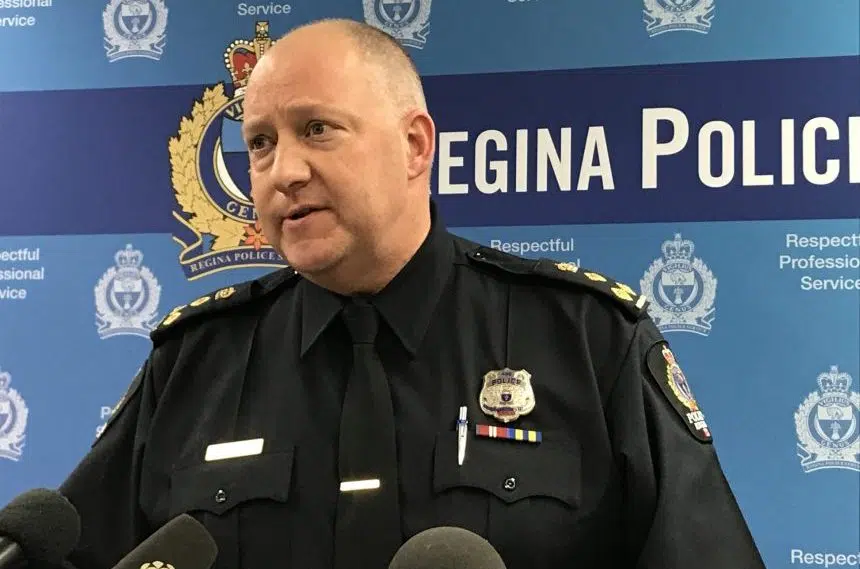Slow-moving vehicle protests by members of Unifor Local 594 have been causing headaches for morning commuters in Regina lately, but Police Chief Evan Bray says officers are limited in their ability to enforce traffic violations.
“When you have 700 vehicles circling a 14-block radius, those vehicles, no matter if they want to drive the speed limit, they’re not going to be able to. So (people are getting) caught up in that,” Bray said Wednesday during his regular appearance on Gormley.
“Where does it start? Where does it end? Who’s the leader? Is someone driving slow that’s causing it? It’s basically a big circle of vehicles that’s mixed in with people commuting to work (and) people just using the roadway and it becomes very, very challenging for us.”
Due to the COVID-19 pandemic, public gatherings are capped at 10 people. The union, which represents locked-out workers at the Co-op Refinery, has resorted to other ways to draw attention to the ongoing labour dispute, such as going for drives along Ninth Avenue North and Ring Road between Winnipeg Street and McDonald Street, and around the Saskatchewan Legislative Building.
The protests are different from parades, which involve closing streets — and that requires a permit, Bray said.
Police have met with union leaders to talk about the potential of notifying the public ahead of time so drivers can avoid the traffic jams.
“They usually happen for a one-hour period. Is there a way we can encourage the public to take an alternate route that might solve some of those congestion problems?” Bray said.
“I think that’s probably what ultimately (the union members) would like is to cause some inconvenience that brings their issue to the forefront and ultimately puts pressure on someone to move in this labour dispute.”
Fewer vehicles, but more infractions
The pandemic’s effect on crime in Regina has been mixed.
Police have not observed big changes in violent crimes or those committed against people. But property crime, including break-and-enters and theft, is down 25 per cent from this time last year.
“A lot of our theft category, which is a big part of it, has to do with shoplifting. With businesses closed, that changes greatly as well,” Bray said.
However, police have seen a rise in traffic infractions, even though fewer vehicles are on the roads.
“We were seeing a lot of people speeding, not following laws and I think that comes with roadways that were more open (and with) less vehicle traffic,” said Bray, who noted most of the violations are happening on main thoroughfares.
He also reminded listeners that speed limits in school zones remain in effect, from 7 a.m. to 7 p.m., seven days per week.
One area in which police haven’t seen a decrease is drug overdoses. Bray said there have been 314 overdoses reported to police so far in 2020 and investigations have led to a 750 per cent increase in fentanyl seizures by Regina police over the past two years.
“If we could take every drug off the streets right now, we have not solved the drug problem,” Bray said. “We’ve solved the supply, but we’ve still got a lot of addicts who really are struggling with a health issue that needs to be addressed or else we’re going to continue to have problems.”
Bray said the police service is still getting calls from people about potential violations of the public health orders put in place due to COVID-19, but just one ticket has been issued.











